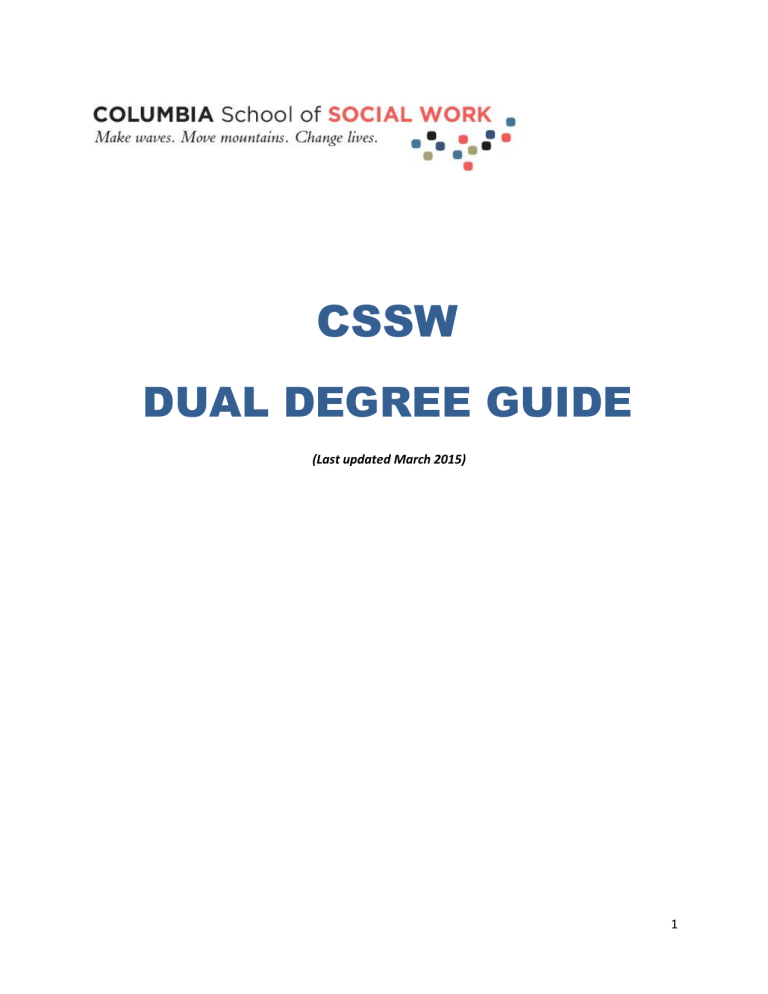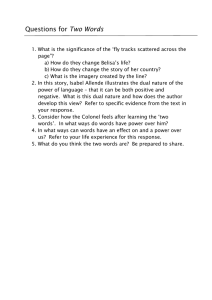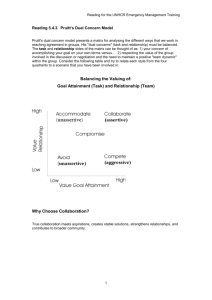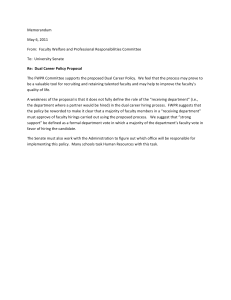Dual Degree Guide - Columbia University School of Social Work

CSSW
DUAL DEGREE GUIDE
(Last updated March 2015)
1
Table of Contents
2
CSSW DUAL DEGREE PROGRAM: THE POWER OF TWO
(DEGREES!)
The Dual Degree program at the Columbia School of Social Work enables students to pursue complimentary studies in Social Work and a second, related discipline. Social Work has partnered with eight other Columbia University schools and affiliates to confer two individual master’s degrees in three to four academic years (less time and cost than if pursued separately).
CSSW currently maintains Dual Degree partnerships with:
Bank Street College
MSW/MS of Special Education
Jewish Theological Seminary
MSW/Master of Jewish Studies
Columbia Business School
MSW/Master of Business Administration
Columbia Law School
MSW/Juris Doctorate
Mailman School of Public Health
MSW/Master of Public Health
Union Theological Seminary
MSW/Master of Divinity
School of International and Public Affairs
MSW/Master of Public Policy and Administration
MSW/Master of International Affairs
School of Architecture
MSW/Master of Urban Planning
ADMISSIONS
Admission to CSSW has no bearing on the potential admission to any partner school. Students may apply for a dual degree with a participating institution prior to, concurrently with, or following matriculation at the School of Social Work, but no later than the second term of the first year of
T6010 Field Education . Separate applications must be submitted to each school . Please visit the
CSSW Office of Admissions for more information on applying to the School of Social Work.
Official Dual Degree status is contingent on acceptance to both schools. Once the partner school admissions offer has been accepted, students must complete the CSSW Dual Degree Enrollment
Declaration Form, and submit a copy of the partner school’s admissions letter to Room 520 of the SW building. This enables the Office of Student Services to update a student’s record to reflect their Dual
Degree status, assist in monitoring degree and program requirements, add students to all relevant SW and Dual Degree listservs, and help coordinate enrollment, scheduling, and financial aid at the appropriate school. Furthermore, we want to keep everyone CONNECTED to the Social Work community!
3
ACADEMICS
Depending on the chosen Dual Degree program, students can expect to complete their degrees in a three- or four-year span. The MSW portion of the Dual Degree program requires a minimum of 45 –
57 total credits, depending on the chosen SW method area/academic program. Each partner school maintains their own individual credit minimum graduation requirement , which is listed below:
THREE-YEAR PROGRAMS Credit Min.
School of Intl & Public Affairs (SIPA) 45
Columbia Business School 45
School of Architecture
Mailman School of Public Health
45
39 - 45
FOUR-YEAR PROGRAMS Credit Min.
Jewish Theological Seminary 24
Union Theological Seminary 59
Bank Street College
Columbia Law School
48 - 54
73
*As schools may change their degree requirements year to year, you must double-check your partner school requirements with that school’s Office of Student Affairs/Student Services.
THREE-YEAR PROGRAMS
Students can expect to spend one year at CSSW, one year at their partner school, and the third
“split year” divided between the two. Your “split year” is deemed the year that each school manages your billing and financial aid for one term and you are enrolled in classes at both schools. Please note: One exception is the Mailman School of Public Health , which requires its
Accelerated MPH for all Dual Degree students. The Accelerated MPH consists of three consecutive, intensive terms (Fall, Spring and Summer) spent at Mailman, typically taken after the student’s first year of Field Education (T6010) at CSSW. Students would then return to CSSW for another full year, with no “split year.”
FOUR-YEAR PROGRAMS
Students can expect to spend two full years each at CSSW and their partner school, with no
“split year.”
For all programs, students have the ability to cross-register for certain required background, practice, and elective courses at CSSW, while billed through their partner school. All requests are accepted online through the Cross-Registration Form for Dual Degree Students In-Residence at the Partner
School . Students billed through the School of Social Work may also cross-register into courses through their partner school, but must adhere to the host school’s cross-registration policies and procedures.
@ THE PARTNER SCHOOL
Each partner program has specific course requirements. In general, CSSW field of practice and elective requirements are met at the participating partner school. With the exception of the Union Theological
Seminary and Bank Street College * , dual degree students are not required to take the second-year field of practice course (T69**). However, Advanced Clinical Practice and AGPP student are required to select a field of practice for field placement purposes (SEA & Policy students are exempt) .
4
*NOTE : Bank Street dual degree students must select either T6920 Family, Youth, & Children’s Services or T6960
School-Based Services as their field of practice.
SPECIAL EXEMPTIONS & REQUIREMENTS
SIPA, Law School and Mailman School of Public Health dual degree students are exempt from taking T6501 Social Work Research, T7501 Clinical Practice Evaluation and T6416
Program Evaluation. Students complete the equivalent courses at their respective schools.
SIPA, Law School, Mailman School of Public Health and the School of Architecture students are required to take electives as part of their degree requirements. Students in other dual degree programs may take electives, but they will not count toward fulfilling degree requirements (however certain electives may fulfill various state licensure requirements).
Students enrolled in a dual degree program may be required to take additional points at
CSSW depending on their advanced practice method concentration requirements. For
Policy Practice and Social Enterprise Administration dual degree students, the total point requirement for those programs may exceed the typical 90 points because of the required non-elective courses for these method areas.
@ THE SCHOOL OF SOCIAL WORK
To complete the Social Work component of the curriculum, dual degree students MUST:
Review the School of Social Work recommended Dual Degree Study Plans ;
Officially register through CSSW for a minimum of three full-time terms, not including the
Summer session (unless in the CSSW 16-Month Program);
Complete all background and foundation practice courses;
Complete all practice courses in the chosen method area;
Complete the program’s field education requirements;
Notify the respective schools’ coordinators, advisors and financial aid office of the coming year’s course plan each year.
File the appropriate registration and financial aid documents with the respective participating schools each term or year, as required.
Irrespective of the school through which a student is billed and in-residence, students are always encouraged to keep in close contact with the faculty mentor for their dual degree program each term:
Jewish Theological Seminary Assoc. Dean Allen Zweben
Business School
SIPA (Intl Affairs/Public Admin)
Bank Street College
Law School
Mailman Public Health
Union Theological Seminary
School of Architecture
Professor Steven Schinke
Professor Neeraj Kaushal
Assoc. Dir. Cindy Bautista
Professor Vicki Lens
Professor Lucia McBee
Professor Barbara Simon
Professor Jane Waldfogel
5
Degrees from each school can only be conferred concurrently -- Dual Degree students must complete
ALL program requirements for BOTH schools prior to receiving EITHER degree. If either program’s requirements remain unfulfilled, NEITHER degree will be awarded.
FINANCIAL AID & HEALTH INSURANCE
FINANCIAL AID
Financial aid, including institutional aid (scholarships), federal student loans, and Federal Work Study
(FWS), is awarded through the school through which the student is billed.
If a student qualifies for $20,500 in Federal Unsubsidized Stafford loans, and they are in- residence and billed through the School of Social Work for the entire academic year, then
$10,250 in loan funds (less origination fees) will disburse each term through CSSW. This will be consistent during the student’s time in-residence at their partner school for a full academic year.
During the “split year” (if applicable), the student will receive financial aid from their respective school each term. E.g., $10,250 from SW in the Fall, and $10,250 from the partner school in the
Spring.
If a student is billed through CSSW, any awarded Federal Work Study can be used for hours
worked at their field placement. FWS NOTE: During a split year, if a student is awarded Federal
Work Study funds while billed through their partner school , those funds CANNOT be earned via their field placement. Additional employment outside of the field placement must be sought in order to use FWS monies awarded through the partner school.
Bank Street and JTS students who intend to be dually enrolled at the partner school and SW, and will be seeking financial aid from the School of Social Work to cover costs at both schools must provide the SW Office of Financial with documentation from the partner school that includes the total number of credits they will be taking, tuition and fees that will be charged at the partner school, and any aid they will be receiving from the partner school. The School of Social Work will then take all of these into account when adjusting the student’s cost of attendance and federal loan eligibility.
Contact the SW Office of Financial Aid for further information.
HEALTH INSURANCE
The University’s billing system charges CSSW students for health insurance automatically when the student registers full-time (a minimum of 10.5 credits) each term. If a student already has medical insurance coverage, they may request to waive the Columbia Student Medical Insurance Plan. Details on waivers, the Student Medical Insurance Plan benefits, etc., can be found online .
6
Dual degree students who are in their “split year” of residency with CSSW and the Mailman School of
Public Health, and enroll in the Health Sciences Campus Student Medical Insurance Plan during the Fall term must remain enrolled in this more expensive plan for the Spring. It is a year-long election. Students may not change insurance plans midyear.
Dual degree students who are registered for classes at the Union Theological Seminary, the Jewish
Theological Seminary or Bank Street College BUT have registered for FEWER than 10.5 credits at CSSW
( even though the total number of points they are taking may be 10.5 or more points) will NOT be billed automatically for health insurance. In this case, the student must manually enroll by visiting http://health.columbia.edu/insurance , and completing and submitting the appropriate enrollment forms.
FIELD EDUCATION
Dual degree students must complete four terms of Field Education. All students should participate fully in the Field Education placement planning process, which includes:
Attending the annual Placement Planning Fair (held each Spring) prior to entering T6020
Second-Year Field Work;
Attending seminars and information sessions, when available;
Completing and submitting the Field Education Placement Form by the stated deadline.
Students in a dual degree program that includes a “split year” will be required to complete one term of their field placement while in-residence (for billing and financial aid) at their partner school. As Field
Education must be taken concurrently with at least one required practice course, students must also cross-register into the required SW practice course while in-residence at the partner school, if they are in field placement.
On the Second Year Field Placement Selection Form, students must indicate the partner school they also plan to attend. If the student has not yet received an admissions offer from the partner school, they must inform the Field Education Department and Office of Advising once an offer is extended and accepted. The student can then be placed.
7
CAREERS PATHS
MSW/Master of Business Administration High-level administrative positions in agencies, non profit organizations, corporate settings.
MSW/Master of Public Health
MSW/MA Jewish Studies
MSW/Juris Doctorate
MSW/Master of Divinity
MSW/Master of International Affairs
MSW/Master of Public Administration
MSW/Master of Special Education
MSW/Master of Urban Planning
Local, national, and global health outreach.
counselors in Jewish community services.
Program specialists, administrators, policy analysts, and
Legal positions in public service, family, human rights, immigration law.
Social work in parish ministries, education, hospitals.
Managers and analysts in public agencies, local & national political offices, NGOs, international organizations.
Positions in schools and programs offering comprehensive services for children and families with special needs.
Positions in social services, public housing, issues of gentrification, community development, land use.
ALUMNI
8
DEGREE PROGRAMS
SOCIAL WORK AND BUSINESS ADMINISTRATION
By completing 90 points (45 in social work and 45 in business), the student can earn a Master of Science in Social Work and a Master of Business Administration. At the Columbia Business School , dual degree students may include a combined maximum of three credits of independent study and field studies in their required 45 credits. While students generally register for 15 credits per term, they may take up to
18 credits. Dual degree candidates must fulfill Columbia Business School’s core curriculum requirements. Courses from other schools are not accepted as a substitute.
However, students may exempt out of core courses by passing an exemption exam. This does not reduce the total number of credits required for the MBA degree (45); it enables students to take additional electives. Dual degree students must complete their first two Business School terms of residence consecutively, to receive the full benefit of our core curriculum and cluster system.
After those two terms, students may take courses in either school, regardless of where they are in residence.
Students typically complete the dual degree in three academic years. Dual degree students must register for at least three full-time terms at each school.
SOCIAL WORK AND PUBLIC HEALTH
By completing 84-90 points (with at least 45 points in social work) the student can earn the Master of
Science in Social Work and the Master of Public Health at the Mailman School of Public Health . Students choose the public health concentration most compatible with their career goals. Choices include general public health, epidemiology, health policy and management, population and family health, and sociomedical sciences. All students are required to take public health core courses.
Dual degree students are required to take at least 39 public health credits. Most of these students will complete the majority of their PH program in their first year of residence at the Mailman School via the
Accelerated MPH program and complete some requirements in their second year (when students are in residence at partner schools). The requirements in year two potentially include some coursework and the student's capstone/thesis.
SOCIAL WORK AND JEWISH STUDIES
By completing 45 points in social work and at least 24 points at the Jewish Theological Seminary , students can earn the Master of Arts in Jewish Studies and the Master of Science in Social Work. The degree-granting school will accept as transfer credits the number of credits earned at the other school to meet the appropriate requirements. As an example, the School of Social Work will accept 15 elective course points taken at Jewish Theological Seminary, and Jewish Theological Seminary will accept up to nine elective course points taken at the School of Social Work.
For students with adequate undergraduate training in Jewish studies, it is possible to complete all requirements in two calendar years (four consecutive terms, including one Summer). On average, students need five terms and two summers to complete the program. Students must be admitted to both programs at the time of matriculation in order to pursue this dual degree. Classes must be taken at both schools concurrently.
SOCIAL WORK AND LAW
By completing 45 points at the School of Social Work and 73 points at Columbia Law School , a student earns both the Master of Science in Social Work and the Juris Doctorate in four calendar years.
9
SOCIAL WORK AND DIVINITY
By completing 45 points in social work and 59 points at the Union Theological Seminary , students can earn the Master of Divinity from the Union Theological Seminary and the Master of Science from the
School of Social Work. This dual degree program takes four years to complete. You may download a UTS degree planner that illustrates how the 104 credits are to be completed. Students must complete their coursework at Union Theological Seminary before beginning the social work portion of the degree.
SOCIAL WORK AND URBAN PLANNING
By completing 90 points (45 in social work and 45 in urban planning) the student can earn degrees in social work and in urban planning. Columbia’s Graduate School of Architecture, Planning, and
Preservation (GSAPP) Urban Planning students are required to complete a thesis, which will be carried out in the final year of study. Planners in dual degree programs where the complementary program also requires a thesis are welcome to develop a thesis topic that bridges both disciplines and satisfies requirements for both programs. The program takes six terms to complete; the student must register for at least three terms in each school.
SOCIAL WORK AND PUBLIC ADMINISTRATION OR
SOCIAL WORK AND INTERNATIONAL AFFAIRS DUAL DEGREE PROGRAM
By completing 90 points (45 in social work and 45 at SIPA) students in the public administration (MPA) dual degree program combine their social work program with the study of social policy formulation and administration in the public arena at the School of International and Public Affairs. Those enrolled in the
International Affairs (MIA) program receive a valuable base in social work education, international politics and economics. Students increase and enhance their professional skills by uniting theoretical and client-based instruction in the social services and academic preparation in U.S. and international social policies and programs.
For both the MPA and MIA dual degree programs students must enroll at each school for three terms.
SOCIAL WORK AND SPECIAL & GENERAL EDUCATION
Students in this program earn the degrees of Master of Science in Social Work and Master of Science in
Education, with specialization in special education, by completing 48 points at the School of Social Work and 48 to 54 points in the Special Education Programs at Bank Street College of Education . The number of points required depends on which age band is selected: Childhood Special and General Education or
Early Childhood Special and General Education . The program offers supervised field education both in special education and social work in addition to the required courses in each school.
10
CONTACTS
Karma Lowe, Director of Enrollment,
Student Services & Financial Aid
Cheiku Camara, Manager of Enrollment
& Student Services
Office of Student Services
Office of Financial Aid
Office of Advising
Office of Field Education
Ovita Williams Interim, Assistant
Dean & Director, Field Education
KNL3@columbia.edu
CBC2117@columbia.edu
swstudentservices@columbia.edu
swfinaid@columbia.edu
swadvising@columbia.edu
swfield_education@columbia.edu
OFW1@columbia.edu
COLUMBIA UNIVERSITY SCHOOL OF SOCIAL WORK http://socialwork.columbia.edu/
1255 Amsterdam Avenue
New York, NY 10027
Main: 212.851.2300
For a full list of Student Resources and contacts: http://socialwork.columbia.edu/student-resources
11



